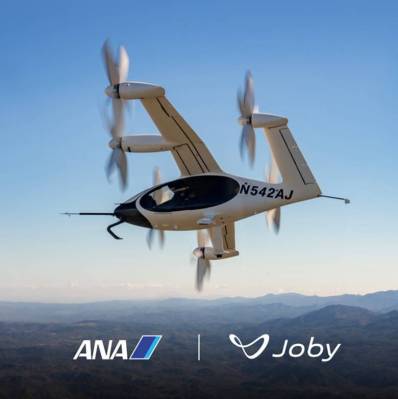
Joby Aviation is partnering with Japanese airline ANA to bring aerial ridesharing services to Japan. Toyota Motor Corporation will be partnering with the two companies, as well, in order to explore ways to connect the air taxis to ground-based transportation.
Joby’s intent to start up operations in Japan comes to light a week after the company announced plans to launch an air taxi service in South Korea in partnership with SK Telecom. Joby will work with SKT spinoff T Map Mobility platform to integrate air taxis into T Map’s subscription-based mobility-as-a-service platform.
The companies were unable to provide specifics on the service, such as when they would begin piloting Joby’s aircraft, when they expect to bring a commercial service to Japan and whether ANA or Joby would be operating it or how customers would interact with it. Those details will be coming “in due course,” according to a Joby spokesperson, who noted that Joby, ANA and Toyota are now in the planning phase as they consider moves like developing infrastructure, pilot training, flight operations, regulatory requirements, public acceptance and how to connect aerial transportation to the larger transit ecosystem.
Toyota represents not only a partner in this future service, but also one of Joby’s strategic investors. The auto giant led Joby’s $590 million Series C round in 2020 and has shared expertise with the startup on electrification technology, as well as manufacturing, quality and cost controls, according to a Joby spokesperson.
“Today’s announcement is the first step towards defining what a future air taxi service might look like in Japan,” the spokesperson told TC. “The parties will now collaborate on all aspects of establishing this revolutionary new form of transportation, including potential routes.”
Joby’s aircraft has a maximum range of 150 miles and a top speed of 200 miles per hour. The startup estimates that a trip from Kansai International Airport to Osaka train station could take less than 15 minutes in one of its vehicles, rather than an hour by car.
Joby’s electric vertical takeoff and landing (eVTOL) vehicles can only fit four passengers, so for initial applications at least, it’s likely that commercial services will be limited. Until Joby starts mass-producing its current models or building much bigger eVTOLs, we’re probably a few years off from air taxi services being commonplace. That’s not only because of the time and money needed to build eVTOLs, but also because of potential regulatory hold-ups. Joby still needs to get certification in every market it’s trying to enter, but last week it did reach a milestone with the Federal Aviation Administration in the U.S. Department of Transportation by signing a G-1, or stage four, Certification Basis for its aircraft. This allows the company to start conformity testing and enter the “implementation phase” in the U.S., which basically means Joby got the OK to design and manufacture composite parts for its aircraft.
In Japan, the certification of eVTOLs is being studied by the Public-Private Council for the Air Mobility Revolution, a combination of academics, researchers, airlines, startups and public sector bodies that want to accelerate the adoption of aerial ridesharing in Japan — Joby, Toyota and ANA are all members of this group. Final certification will be authorized by the Japan Civil Aviation Bureau, which is part of the Ministry of Land, Infrastructure, Transport and Tourism.










